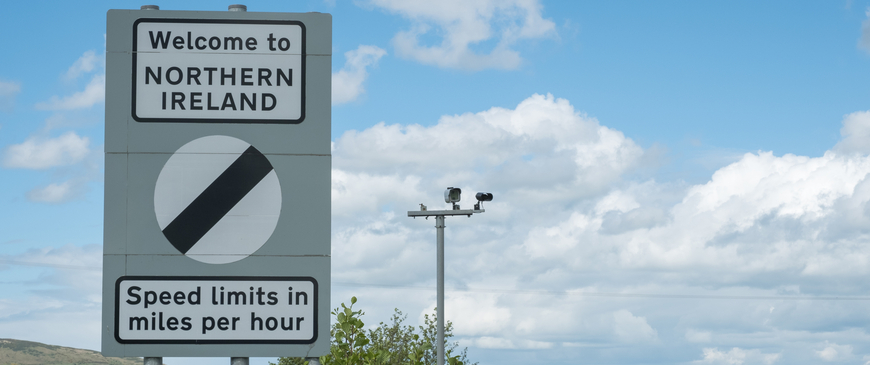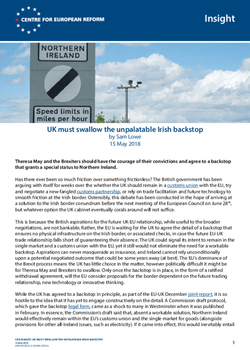
UK must swallow the unpalatable Irish backstop
Theresa May and the Brexiters should have the courage of their convictions and agree to a backstop that grants a special status to Northern Ireland.
Has there ever been so much friction over something frictionless? The British government has been arguing with itself for weeks over the whether the UK should remain in a customs union with the EU, try to negotiate a new-fangled customs partnership, or rely on trade facilitation and future technology to smooth friction at the Irish border. Ostensibly, this debate has been conducted in the hope of arriving at a solution to the Irish border conundrum before the next meeting of the European Council on June 28th, but whatever option the UK cabinet eventually settles on will not suffice.
This is because the British aspirations for the future UK-EU relationship, while useful to the broader negotiations, are not bankable. Rather, the EU is waiting for the UK to agree the detail of a backstop that ensures no physical infrastructure on the Irish border, or associated checks, in case the future EU-UK trade relationship falls short of guaranteeing their absence. The UK could signal its intent to remain in the single market and a customs union with the EU, yet it still would not eliminate the need for a workable backstop. Aspirations can never masquerade as insurance, and Ireland cannot rely unconditionally upon a potential negotiated outcome that could be some years away (at best). The EU’s dominance of the Brexit process means the UK has little choice in the matter, however politically difficult it might be for Theresa May and Brexiters to swallow. Only once the backstop is in place, in the form of a ratified withdrawal agreement, will the EU consider proposals for the border dependent on the future trading relationship, new technology or innovative thinking.
Aspirations can never masquerade as insurance, and Ireland cannot rely unconditionally upon a potential negotiated outcome that could be some years away (at best).
While the UK has agreed to a backstop in principle, as part of the EU-UK December joint report, it is so hostile to the idea that it has yet to engage constructively on the detail. A Commission draft protocol, which gave the backstop legal form, came as a shock to many in Westminster when it was published in February. In essence, the Commission’s draft said that, absent a workable solution, Northern Ireland would effectively remain within the EU’s customs union and the single market for goods (alongside provisions for other all-Ireland issues, such as electricity). If it came into effect, this would inevitably entail checks on goods arriving from the rest of Britain into Northern Ireland, erecting a border within the UK. Thus, many in the UK, from across the political spectrum, view the proposal as an implicit attack on the UK’s constitutional order. Theresa May said that “no prime minister could ever agree” to it.
The UK can and should propose a new, more palatable, text. But it should also acknowledge that the backstop is unlikely to change substantively. For all the British criticism of the Commission’s text, it has the benefit of being the only proposal to date that would achieve the backstop’s stated objective of avoiding physical infrastructure and associated checks on the Irish border if the future FTA negotiations collapsed. The one area there might be room for compromise and amendment is vis-à-vis the backstop’s scope – what areas does the backstop cover and is it necessary in all cases? On this, the Irish have indicated, in private, that there is room for manoeuvre.
The EU also hopes never to rely on the backstop. While it sees it as necessary in the context of the Irish border, creating a special status for Northern Ireland within the EU’s internal market is not without its legal, practical and political difficulties.
The only other obvious backstop solution would be for the Commission’s proposal, or something similar to the ‘Jersey model’, to apply to the whole UK and not just Northern Ireland. Indeed, this was the dominant British interpretation of the joint report when it was published, with particular weight given to the end of paragraph 49, which says “in the absence of agreed solutions, the United Kingdom will maintain full alignment with those rules of the Internal Market and the Customs Union which, now or in the future, support North-South co-operation, the all-island economy and the protection of the 1998 Agreement.”
The EU will not contemplate the backstop applying to the whole UK, however. When the issue of paragraph 49 is raised the Commission and Ireland point to paragraph 46, which says that the principles and commitments in the joint report “will not pre-determine the outcome of wider discussions on the future relationship between the European Union and the United Kingdom and are, as necessary, specific to the unique circumstances on the island of Ireland.” While Northern Ireland may be granted special access to European goods and agriculture markets as a result of its special circumstances, the EU refuses to allow the backstop to become the baseline offer to the whole of the UK.
Accepting that a whole-UK backstop is not tenable will not be easy, but the sooner UK politics internalises the fact, and engages on the detail of a workable text, the better.
The biggest obstacle preventing Theresa May from agreeing to the backstop, and moving the negotiations forward, is the Democratic Unionist Party (DUP), which is propping up her government. The DUP is inherently hostile to any post-Brexit arrangement that erects a border between Northern Ireland and the rest of the UK. May’s problem is compounded by the fact that almost the only Northern Irish voice heard in London is that of the DUP, because the Northern Ireland power-sharing executive is suspended, and Sinn Féin refuses to take up its seats in Westminster. The DUP does not speak for the whole of Northern Ireland, and especially not the majority of those who live on the border – every parliamentary constituency on the border is held by Sinn Féin. The government should never have got itself into a position where a party representing only one of Northern Ireland’s communities could hold it hostage.
May could decide to throw the DUP under a bus at the eleventh hour, challenging them to withdraw their support from the government. The DUP has long been hostile to Jeremy Corbyn, and it is very difficult to bring down even a minority government under the terms of the Fixed Term Parliaments Act. May could probably afford to risk the limited damage the DUP might do to the government’s wider programme if it moved into opposition. It is more likely, however, that May would engage with the DUP to reassure them that her government never intends to rely on the backstop but, will find a compromise text and intermediate solutions that their party and constituents can live with. It is notable that Dublin and Brussels have recently made positive noises about the customs partnership in order to reassure the DUP and remain-leaning Tories that the triggering of the backstop is not inevitable, so long as the future UK-EU partnership is sufficiently comprehensive.
The UK should therefore put just as much effort into developing a backstop that would preserve the hard-won status quo in Northern Ireland.
If a border does go up between Northern Ireland and the rest of the UK, there is much greater scope for the use of technology and ‘innovative’ solutions, since, unlike on the land border, the infrastructure already exists at the ports and airports. Some checks related to the trade in live animals between Britain and Northern Ireland already happen even now, and the delays already created by the sea crossing provide more time to deal with additional bureaucracy whilst in transit. The DUP might not like it, but they may be forced to live with it.
The government is confident that its proposals for the future relationship (whatever they turn out to be) will ultimately govern trade and commerce at the Irish border. In that case, it is right to invest in a forward-looking debate on customs, leading to a consensus around a workable future model. But it cannot shy away from the need for, and its commitment to, an insurance policy in case an agreement with the EU is either not reached or does not deliver on shared commitments to no infrastructure and associated checks on the Irish border. The UK should therefore put just as much effort into developing a backstop that would preserve the hard-won status quo in Northern Ireland. A serious British response to the Commission, focused on improving the backstop rather than rejecting it out of hand, will move the Brexit negotiations forward. More importantly, it will help to ensure that no matter what happens with Brexit, the UK’s departure from the EU does not make the Irish border a focus of conflict again.
Sam Lowe is a research fellow at the Centre for European Reform.


Comments
By agreeing the backstop, the backstop would become the baseline for NI border and the UK could be held to ransom by the EU indefinitely. The backstop should at the very least have a sunset clause so that it cannot be relied upon by Ireland and the EU indefinitely. After all, the December agreement said that both parties wanted a negotiated agreement as part of a future trading relationship. The backstop should therefore only be framed as a stop gap solution whilst the future trading relationship is discussed and agreed.
Promise that and the backstop disappears. Let's face it we are going to continue being aligned with European regulation anyway so might as well get the benefits for it.
Indeed, in earlier and more enlightened times, this assault on a nation's territorial integrity would be seen as an act of war.
WTO Brexit is now absolutely necessary, along with the dissolution of all military and security agreements with the EU.
Add new comment